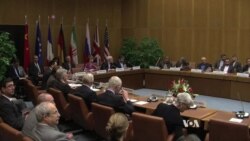Talks aimed at ensuring that Iran cannot build a nuclear weapon, and ending international sanctions against it, missed a self-imposed deadline in 2014 and will resume next year. Experts say reaching an agreement is essential for both sides but will not be any easier in the new year.
The negotiators had already extended their talks once, leading to considerable disappointment when they missed their second deadline in November. But U.S. Secretary of State John Kerry said what he called “substantial progress” justified extending the talks again.
“Given how far we have come over the past year, and particularly in the last few days, this is not certainly the time to get up and walk away,” said Kerry.
Six countries representing the United Nations are negotiating with Iran to reduce its nuclear fuel enrichment capacity to a level that would leave it as much as a year away from making a nuclear bomb if its leaders were to decide to do so. Currently, experts say, it is only about two months away.
Iranian officials say they have no intention of obtaining nuclear weapons, but they have a large nuclear program and want a bigger one, and that raises concerns in the international community.
Experts say the dispute will not be any easier to settle next year.
“It’s hard to see what would change to make a deal any more likely next year when they couldn’t reach a deal in the past 12 months of negotiations,” says Mark Fitzpatrick from the International Institute for Strategic Studies.
But he adds it’s important to keep negotiating anyway.
“Without diplomacy Iran’s program would not remain capped. We would be back in a cycle of confrontation and crisis that could lead to Iran getting closer to a nuclear weapon and could lead to military action,” says he.
But Fitzpatrick and others say the interim accord, reached in late 2013, is not good enough for the long term.
Trita Parsi, an Iranian-American author and activist with the National Iranian American Council, agrees.
“The interim deal, even if it may be attractive to both sides right now, probably is not sustainable in the long run because the political landscapes on both sides are going to be somewhat unforgiving and not permit this to be extended over and over again,” says Parsi.
Experts say Iranian opponents of a deal can be controlled by the Supreme Leader, if he likes the final document. But Parsi says Iran is concerned that Republican gains in the November election could make it impossible for President Barack Obama to deliver full sanctions relief.
“There are question marks in the minds of the Iranians as to whether the American promises about sanctions relief actually can be trusted - not to say that they don’t have enough confidence in the president, but they may not have enough confidence in the U.S. Congress,” says Parsi.
The negotiators have given themselves seven more months to reach an agreement. Parsi says all sides should use that time to muster the political will to accept difficult compromises before patience in Washington and Tehran runs out.





